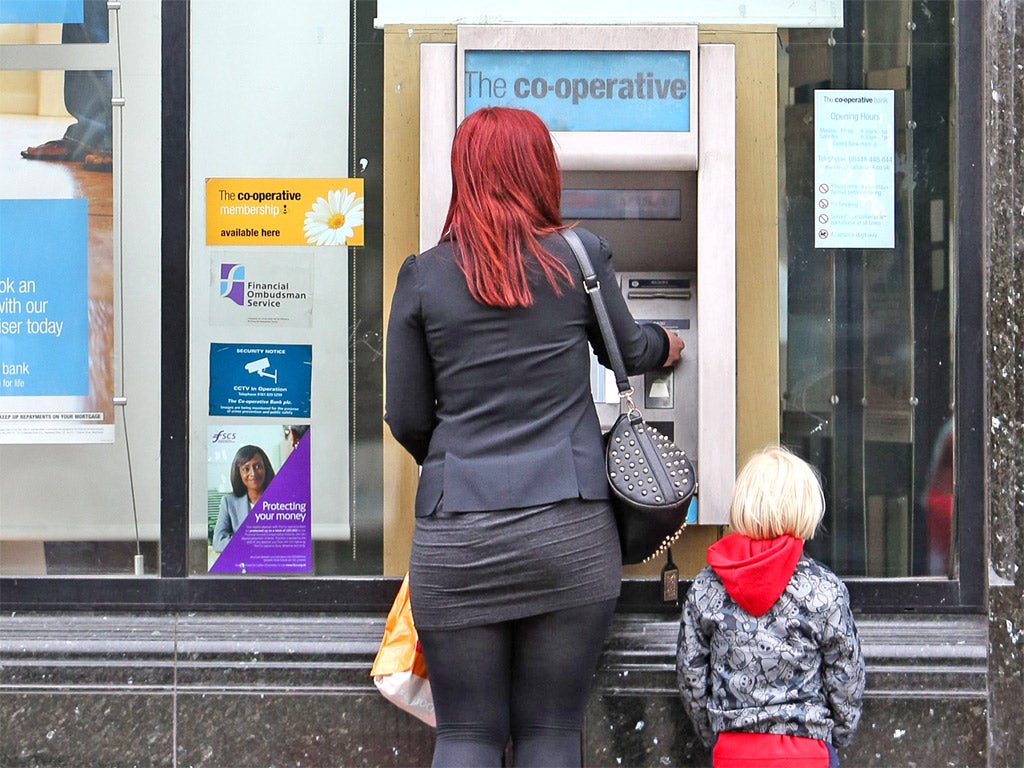Co-op Bank's unique proposition must be preserved
The bank was been let down by previous poor management, but its customers have stuck with it despite its travails because they value its ethical lending policies

Your support helps us to tell the story
From reproductive rights to climate change to Big Tech, The Independent is on the ground when the story is developing. Whether it's investigating the financials of Elon Musk's pro-Trump PAC or producing our latest documentary, 'The A Word', which shines a light on the American women fighting for reproductive rights, we know how important it is to parse out the facts from the messaging.
At such a critical moment in US history, we need reporters on the ground. Your donation allows us to keep sending journalists to speak to both sides of the story.
The Independent is trusted by Americans across the entire political spectrum. And unlike many other quality news outlets, we choose not to lock Americans out of our reporting and analysis with paywalls. We believe quality journalism should be available to everyone, paid for by those who can afford it.
Your support makes all the difference.Dark clouds have been swirling around the Co-operative Bank for years now. There are some in the media who are ready to read its last rites as it scrambles to find a buyer.
The latest example of that is a report from the BBC stating that the bank has been placed under “intensive supervision as survival hopes dwindle”.
Given its troubles, up to an including the failure to pass Bank of England stress tests, I’d be rather surprised if it hadn’t been under intensive supervision for months now and I’d be inclined to ask why if that wasn’t the case.
But, amid a veritable torrent of negative publicity, and the continuing questions about its future, one fact often gets over-looked. That is how sticky the bank’s customer base is.
It’s reasonable to ask whether the Co-op would have withstood what it has withstood without that. Forget last rites. Any other small bank in Co-op’s situation might very well have been buried.
But Co-op is different. It does not lend, or get involved in syndicates that lend, to arms companies, payday lenders, businesses involved in animal testing or environmentally destructive activities. Nasty regimes are also a no no.
If you don’t want the money you hold on deposit with your bank used for those purposes, you know were to go. RBS was until recently a big financier of fossil fuels. HSBC has come under fire over its lending to the palm oil industry. Other banks have similarly seen their names linked to unsavoury industries. Co-op? Not us. No siree.
The problems at Co-operative Bank have been caused because its bosses have not always lived up to the ideals espoused by the institution.
The name everyone remembers is Paul Flowers, the former chairman dubbed the “crystal methodist” for the drug habits that were just one part of a lifestyle bathed in sleaze. The sins of other leaders of the Co-operative, while of rather less interest to the tabloids, were arguably far more damaging to the business. Arrogance, hubris, incompetence, I could go on.
But, at the same time, the bank’s policies have remained in place, and a large chunk of customers that like those policies have remained with it when they might have quit other financial institutions with questions surrounding their financial health.
There is value in that. Business types like to refer to it as “brand equity”. If there is a bidder to be found, and the bank maintains that it is continuing to hold discussions with interested parties, they’ll need to find a way to keep that in place. It’s the most valuable part of the business. It is the business.
But can you marry an ethical lender to one with rather looser rules?
There is clearly an appetite for an ethical bank, and for ethical banking. There is money to be made in providing it.
The best outcome might be for the Co-operative Bank to find a way through its problems, and to emerge as a small, niche player run with a little more care and a little less ambition than it had in the past. However, what can't be denied is that there are real questions over whether that can be achieved.
If it can’t, there ought be an opportunity for someone willing to start afresh, working from the template. Anyone out there?
Join our commenting forum
Join thought-provoking conversations, follow other Independent readers and see their replies
Comments